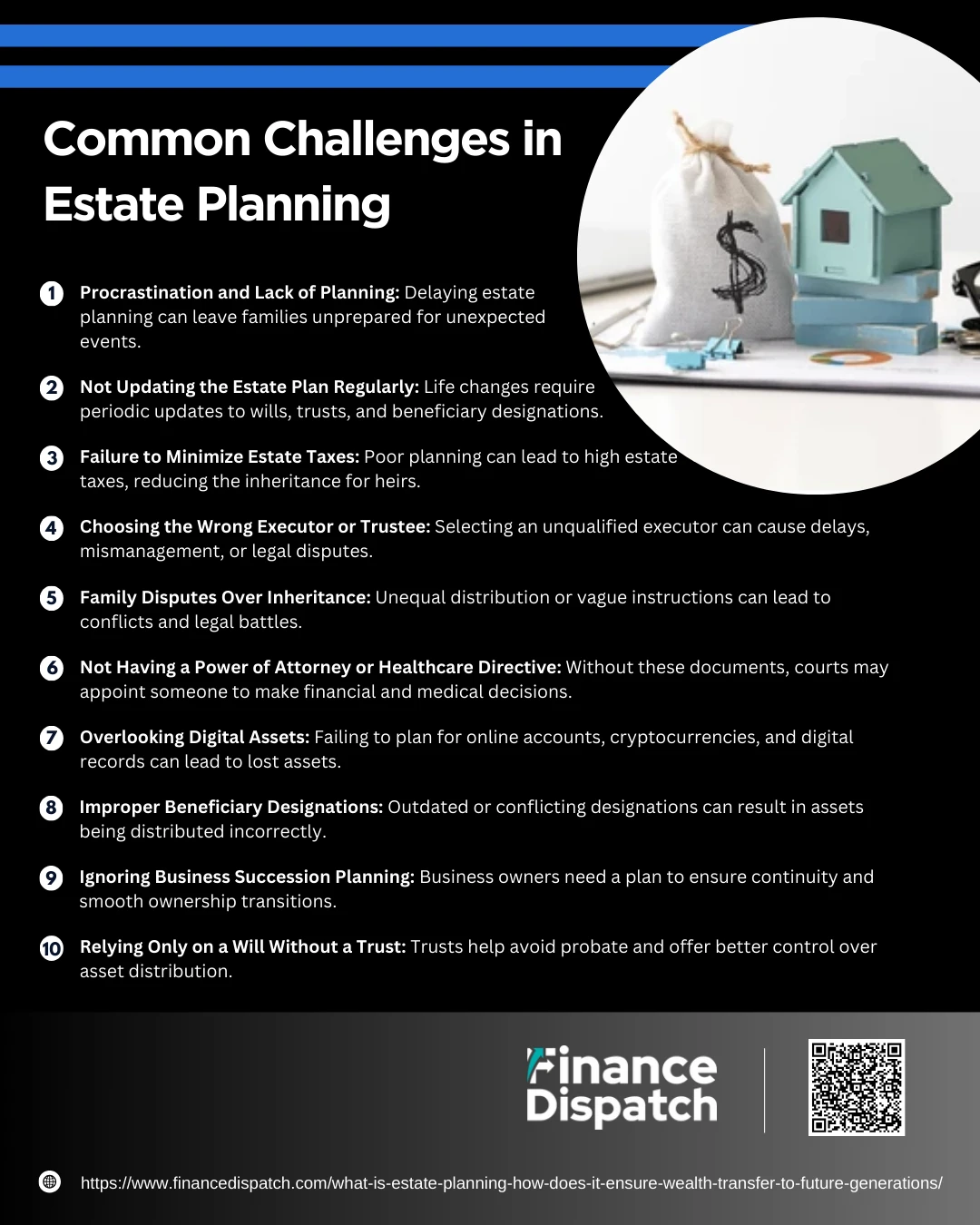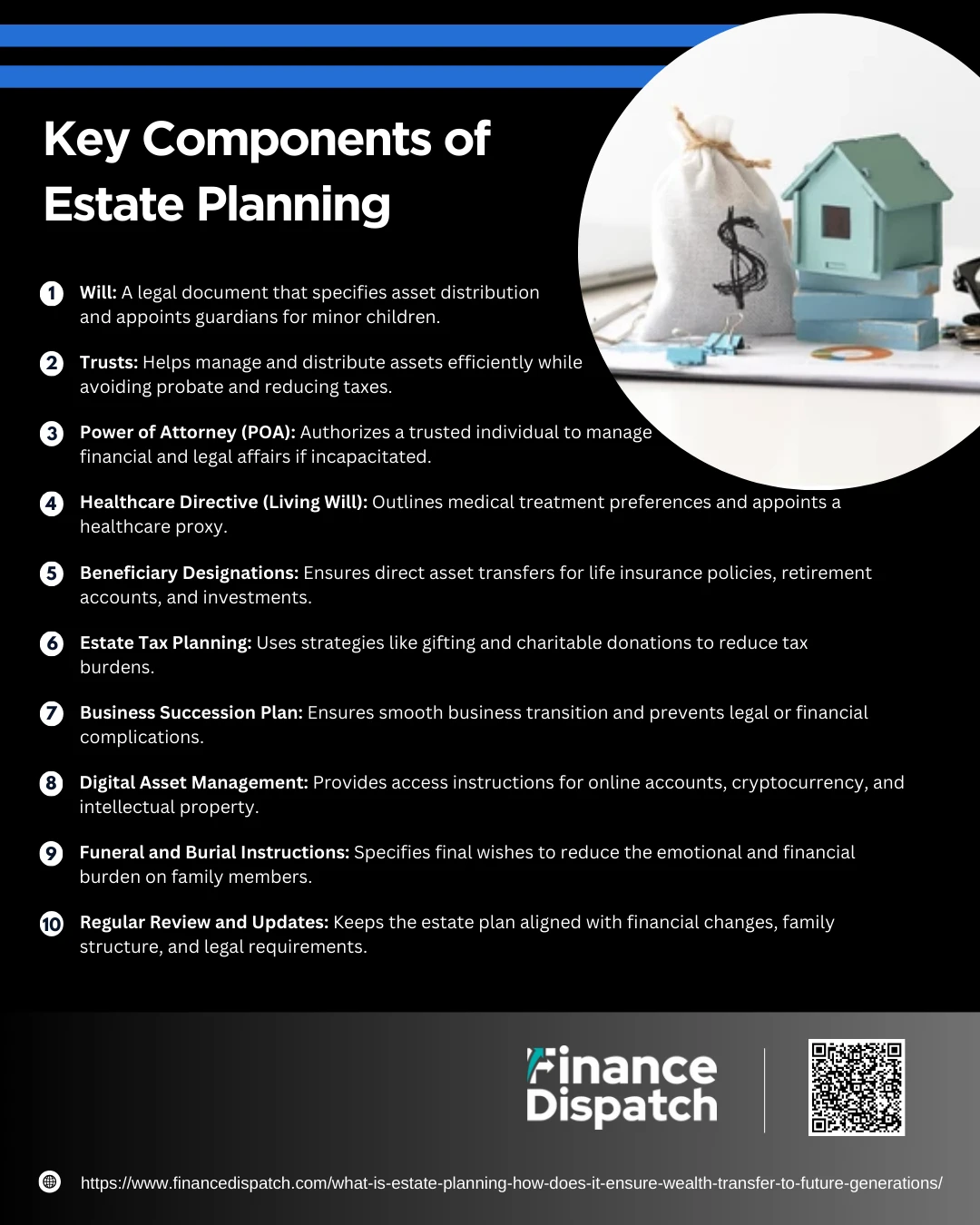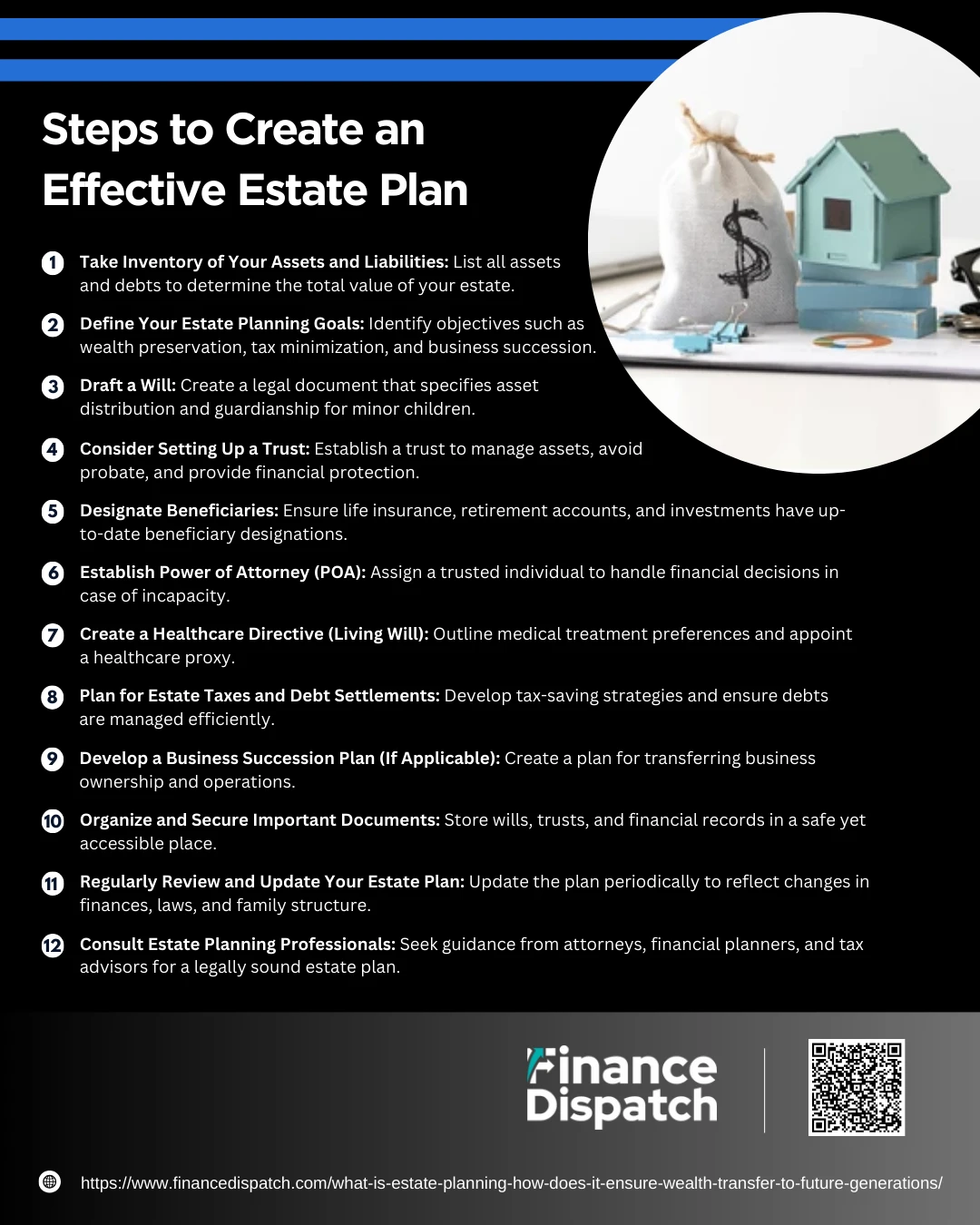Estate planning is a crucial financial strategy that ensures your wealth is managed and transferred according to your wishes, both during your lifetime and after your passing. It involves creating a structured plan for distributing assets, minimizing taxes, and protecting beneficiaries from legal complexities. Contrary to common belief, estate planning isn’t just for the wealthy—it’s essential for anyone who wants to secure their family’s financial future. Without a well-thought-out estate plan, your assets may be subject to lengthy probate processes, high taxation, or even disputes among heirs. By understanding and implementing key estate planning tools, such as wills, trusts, and beneficiary designations, you can safeguard your legacy and ensure a smooth transfer of wealth across generations.
What is Estate Planning?
Estate planning is the process of organizing how your assets will be managed, preserved, and distributed in the event of your incapacity or death. It involves legally documenting your wishes regarding financial matters, property ownership, healthcare decisions, and the care of dependents. A comprehensive estate plan includes key components such as wills, trusts, power of attorney, and beneficiary designations, ensuring that your assets reach the intended recipients while minimizing legal hurdles and tax burdens. Contrary to the misconception that estate planning is only for the wealthy, it is a crucial step for anyone who owns property, has savings, or wants to protect their loved ones from unnecessary financial and legal challenges. Proper estate planning not only provides financial security for your heirs but also helps avoid costly probate processes and potential disputes among family members.
 How Estate Planning Secures Wealth for Future Generations
How Estate Planning Secures Wealth for Future Generations
Building and maintaining wealth is only part of ensuring financial security for your loved ones; the other critical aspect is planning how that wealth will be transferred and managed after your lifetime. Estate planning is the process of legally structuring asset distribution to protect beneficiaries, minimize tax burdens, and avoid unnecessary legal disputes. Without an estate plan, your assets may go through a lengthy probate process, potentially leading to financial strain and conflicts among heirs. By carefully planning your estate, you can ensure that your wealth is preserved and passed down smoothly, securing the financial future of your family for generations to come.
Essential Steps to Secure Wealth Through Estate Planning
1. Create a Will or Trust
A will specifies how your assets should be distributed after your death, while a trust allows you to set conditions for inheritance and manage wealth over time. Trusts can also help avoid probate, ensuring a smoother transition of assets to beneficiaries.
2. Designate Beneficiaries
Naming beneficiaries for life insurance policies, retirement accounts, and investment funds ensures that these assets pass directly to your chosen heirs without being delayed by legal processes. Keeping beneficiary designations up to date is crucial, especially after major life events like marriage, divorce, or the birth of children.
3. Minimize Estate Taxes
High estate taxes can significantly reduce the wealth left for your heirs. Strategies such as gifting assets during your lifetime, establishing irrevocable trusts, and making charitable donations can lower tax liabilities and maximize the inheritance passed on to future generations.
4. Establish Power of Attorney and Healthcare Directives
Appointing a power of attorney ensures that someone you trust can make financial and medical decisions on your behalf if you become incapacitated. Healthcare directives, such as a living will, outline your medical preferences, preventing family conflicts over critical healthcare choices.
5. Consider Life Insurance for Wealth Protection
Life insurance provides financial security for your family by covering estate taxes, debts, and other expenses. It can also serve as a tool to ensure liquidity, preventing the forced sale of valuable assets like real estate or family businesses.
6. Plan for Business Succession
If you own a business, an estate plan should include a clear succession strategy to transfer ownership smoothly. Without a plan, family members or business partners may face financial and operational challenges that could jeopardize the company’s future.
7. Review and Update the Estate Plan Regularly
Estate plans should be reviewed periodically to reflect changes in financial status, family structure, or tax laws. Updating your will, trusts, and beneficiary designations ensures that your estate plan remains effective and aligned with your long-term goals.
8. Use Gifting Strategies to Pass Wealth Efficiently
Gifting assets during your lifetime can reduce the taxable value of your estate while providing financial support to loved ones. Annual tax-free gifts and education funding options like 529 plans are effective tools for wealth transfer.
9. Utilize Charitable Giving for Legacy Building
Charitable donations, whether through direct gifts or setting up charitable trusts, not only benefit the causes you care about but also provide tax advantages that preserve more wealth for your heirs.
Common Myths about Estate Planning
Estate planning is an essential process for securing your assets and ensuring that your wealth is distributed according to your wishes. However, many people delay or avoid estate planning due to common misconceptions. These myths can lead to financial and legal complications for your family in the future. Understanding the truth behind these misconceptions can help you take the necessary steps to protect your legacy and provide peace of mind for your loved ones.
Debunking Common Myths About Estate Planning
1. “Estate planning is only for the wealthy.”
Many believe that only the rich need an estate plan, but estate planning is essential for everyone, regardless of wealth. It ensures that assets are distributed smoothly, prevents legal issues, and helps protect minor children and dependents.
2. “A will is enough for estate planning.”
While a will is a crucial component, it does not cover everything. Trusts, power of attorney, healthcare directives, and beneficiary designations are also necessary to create a comprehensive estate plan.
3. “I am too young to worry about estate planning.”
Estate planning is not just for older individuals. Accidents and unexpected events can happen at any age, and having a plan in place ensures that your assets and medical decisions are handled according to your wishes.
4. “My family knows my wishes, so I don’t need an estate plan.”
Verbal agreements or assumptions can lead to confusion, disputes, and legal battles. Having a legally documented estate plan ensures clarity and prevents misunderstandings among family members.
5. “If I pass away without a will, my spouse will automatically inherit everything.”
State laws determine asset distribution when there is no will, which may not align with your intentions. This can result in assets being divided among multiple heirs, creating unnecessary complications.
6. “A trust is only for avoiding estate taxes.”
Trusts serve multiple purposes beyond tax benefits, such as avoiding probate, protecting assets from creditors, and ensuring controlled distribution to beneficiaries over time.
7. “Estate planning is a one-time process.”
Your estate plan should be reviewed and updated regularly to reflect life changes, such as marriage, divorce, childbirth, financial growth, or new tax laws.
8. “I don’t need an estate plan because I don’t have many assets.”
Even if you have modest assets, an estate plan is still crucial for deciding who will inherit your property, handling medical decisions, and appointing guardians for dependents.
The Impact of Not Having an Estate Plan
Failing to create an estate plan can have serious financial and legal consequences for you and your loved ones. Without a clear plan, your assets may be subject to state intestacy laws, meaning the government decides how your estate is distributed, which may not align with your wishes. This can lead to lengthy probate processes, unnecessary legal fees, and potential disputes among family members. Additionally, without a designated power of attorney or healthcare directive, critical financial and medical decisions may be left in the hands of the courts instead of a trusted individual of your choosing. The absence of an estate plan can also increase tax liabilities, reducing the wealth passed on to your heirs. By neglecting estate planning, you risk creating financial hardship, confusion, and emotional stress for your loved ones at an already difficult time. Taking proactive steps to establish a will, trust, and other essential documents ensures that your assets are protected, your wishes are honored, and your family is financially secure.
 Common Challenges in Estate Planning
Common Challenges in Estate Planning
Estate planning is a crucial process for securing your assets and ensuring a smooth transfer of wealth to your beneficiaries. However, many individuals face challenges that can complicate the process and create unintended financial and legal issues. From tax implications to family disputes, overlooking key aspects of estate planning can result in delays, excessive costs, and even conflicts among heirs. By understanding these challenges, you can take proactive steps to create a well-structured estate plan that aligns with your goals and protects your loved ones.
1. Procrastination and Lack of Planning
Many people put off estate planning, assuming they have plenty of time or believing they don’t have enough assets to make it worthwhile. However, unexpected events such as illness or accidents can leave families unprepared. The best approach is to start early and review your plan regularly to ensure it aligns with your evolving financial situation.
2. Not Updating the Estate Plan Regularly
Life circumstances change over time—marriages, divorces, births, deaths, and financial growth can all impact your estate plan. Failing to update your will, trusts, or beneficiary designations can lead to unintended consequences, such as assets going to the wrong person or family disputes arising. Reviewing your estate plan every few years and after major life events ensures that your wishes remain intact.
3. Failure to Minimize Estate Taxes
Estate taxes can significantly reduce the wealth passed down to heirs. Without proper planning, your beneficiaries may face high tax burdens, leaving them with far less than expected. Strategies like gifting assets, setting up irrevocable trusts, and making charitable contributions can help reduce estate taxes and maximize the value of your legacy.
4. Choosing the Wrong Executor or Trustee
The person managing your estate should be responsible, organized, and capable of handling financial and legal matters. Selecting an unqualified or biased executor or trustee can lead to mismanagement, delays, and even legal disputes among beneficiaries. Choosing a professional fiduciary or a trusted family member with financial expertise can help avoid complications.
5. Family Disputes Over Inheritance
Inheritance-related conflicts are common, especially if asset distribution is perceived as unfair. Unequal distribution, lack of communication, or vague instructions can lead to legal battles that drain resources. To prevent disputes, clearly outline your wishes in a legally binding document and discuss your estate plan with your family to manage expectations.
6. Not Having a Power of Attorney or Healthcare Directive
If you become incapacitated due to illness or an accident, who will make financial and medical decisions on your behalf? Without a power of attorney or healthcare directive, courts may appoint someone to manage your affairs, potentially causing delays and confusion. Naming a trusted person for these roles ensures that your interests are protected.
7. Overlooking Digital Assets
Today, many people have valuable digital assets, including cryptocurrency, online businesses, and digital bank accounts. Without clear instructions, these assets can be lost or inaccessible to heirs. Including digital asset management in your estate plan, along with account login details and instructions, ensures they are properly handled after your passing.
8. Improper Beneficiary Designations
Retirement accounts, life insurance policies, and investment funds require designated beneficiaries. If these designations are outdated or conflicting with your will, your assets may not be distributed as intended. Regularly reviewing and updating beneficiary designations ensures they align with your overall estate plan.
9. Ignoring Business Succession Planning
Business owners must plan for the future of their company. Without a proper succession plan, business operations may be disrupted, and heirs may struggle with legal and financial issues. Creating a structured transition plan ensures business continuity and preserves its value for future generations.
10. Relying Only on a Will Without a Trust
A common mistake is assuming that a will alone is sufficient. While a will is important, it does not prevent probate—a lengthy and costly legal process. Setting up a trust can allow assets to pass directly to heirs without probate, providing privacy and faster distribution. Trusts also offer protection from creditors and legal challenges.
 Key Components of Estate Planning
Key Components of Estate Planning
Estate planning is more than just writing a will—it’s about ensuring that your assets are protected, your wishes are honored, and your loved ones are financially secure. A well-structured estate plan helps prevent legal disputes, reduces tax burdens, and ensures a smooth transfer of wealth to beneficiaries. To create a comprehensive estate plan, it’s essential to include key components that address asset distribution, medical directives, and financial management. Here are the fundamental elements of a successful estate plan.
1. Will
A will is a foundational document in estate planning that outlines how your assets will be distributed and who will inherit them. It also allows you to name guardians for minor children and specify your final wishes. Without a will, your estate will be subject to intestacy laws, meaning the state will decide how your assets are distributed, which may not align with your intentions.
2. Trusts
Trusts provide greater control over asset distribution and can help avoid probate, a lengthy and costly legal process. There are various types of trusts, including revocable living trusts, irrevocable trusts, and special needs trusts, each serving different purposes. Trusts are also useful for asset protection, minimizing estate taxes, and ensuring beneficiaries receive their inheritance responsibly.
3. Power of Attorney (POA)
A power of attorney is a legal document that grants authority to a trusted individual to handle your financial and legal affairs if you become incapacitated. Without a POA, courts may appoint someone to manage your affairs, which can be a complicated and time-consuming process. Choosing a responsible individual as your financial power of attorney ensures that your finances remain in good hands.
4. Healthcare Directive (Living Will)
A healthcare directive, also known as a living will, specifies your medical treatment preferences in case you are unable to communicate your decisions. It can include do-not-resuscitate (DNR) orders, organ donation choices, and pain management preferences. Appointing a healthcare proxy allows someone you trust to make medical decisions on your behalf.
5. Beneficiary Designations
Certain assets, such as life insurance policies, retirement accounts, and investment funds, allow you to name beneficiaries directly. These designations override instructions in your will, making it essential to keep them updated. Regularly reviewing and updating your beneficiary designations ensures that assets are transferred to the intended recipients without legal complications.
6. Estate Tax Planning
Without proper estate tax planning, a significant portion of your assets may go toward taxes instead of your heirs. Strategies such as gifting, charitable donations, and setting up tax-efficient trusts can help minimize estate taxes. Consulting with an estate planning attorney or financial advisor can help you create a plan that maximizes wealth transfer while reducing tax liabilities.
7. Business Succession Plan
If you own a business, having a succession plan ensures that it continues operating smoothly after your passing. Without a clear plan, disputes among family members or partners may arise, potentially leading to business closure or financial loss. A well-structured business succession plan includes appointing successors, outlining management transition strategies, and addressing financial considerations.
8. Digital Asset Management
In today’s digital age, managing online accounts, cryptocurrency holdings, and intellectual property is an essential part of estate planning. Without clear instructions, these assets may be lost or inaccessible to heirs. Your estate plan should include a digital inventory with access details, passwords, and instructions on how to handle these assets.
9. Funeral and Burial Instructions
Specifying your funeral and burial preferences can ease the emotional burden on your family. This may include decisions about cremation or burial, religious services, and memorial arrangements. Pre-planning your funeral can also help avoid financial stress for your loved ones.
10. Regular Review and Updates
An estate plan is not a one-time document—it should be reviewed and updated regularly to reflect changes in your financial status, family structure, or legal requirements. Major life events such as marriage, divorce, childbirth, or acquiring new assets should prompt a review of your estate plan to ensure it remains aligned with your goals.
 Steps to Create an Effective Estate Plan
Steps to Create an Effective Estate Plan
Estate planning is a critical process that ensures your assets are distributed according to your wishes and that your loved ones are financially secure after your passing. A well-structured estate plan helps avoid probate delays, minimizes tax burdens, and provides clear guidance for medical and financial decisions in case of incapacity. Without an estate plan, your assets may be subject to court decisions, causing unnecessary legal complications for your family. By following a step-by-step approach, you can create an effective estate plan that protects your legacy and ensures a smooth transfer of wealth.
Essential Steps to Create an Effective Estate Plan
1. Take Inventory of Your Assets and Liabilities
Begin by listing all your assets, including real estate, investments, bank accounts, retirement funds, and valuable personal belongings. Also, document your debts, such as mortgages, loans, and credit card balances. This helps determine the total value of your estate and ensures nothing is overlooked.
2. Define Your Estate Planning Goals
Consider what you want to achieve with your estate plan. This could include providing financial security for your family, minimizing taxes, supporting charitable causes, or ensuring a smooth business succession. Clearly defining your objectives will guide the structure of your estate plan.
3. Draft a Will
A will is a foundational document that outlines how your assets should be distributed after your death. It also allows you to name guardians for minor children and specify final wishes. Without a will, your estate may be distributed according to state laws, which may not align with your intentions.
4. Consider Setting Up a Trust
A trust can help manage and distribute assets efficiently, avoid probate, and provide tax benefits. Trusts are especially useful for individuals with significant assets, complex family dynamics, or special needs beneficiaries who require long-term financial protection.
5. Designate Beneficiaries
Ensure that your life insurance policies, retirement accounts, and other financial assets have updated beneficiary designations. These designations take precedence over wills, making it essential to keep them current to prevent unintended asset distribution.
6. Establish Power of Attorney (POA)
A financial power of attorney allows a trusted individual to manage your financial affairs if you become incapacitated. Without a POA, the court may appoint someone to make these decisions, which can lead to delays and unintended choices.
7. Create a Healthcare Directive (Living Will)
A healthcare directive specifies your medical preferences in case you are unable to communicate them. This includes life support decisions, organ donation, and pain management preferences. Assigning a healthcare proxy ensures that someone you trust can make medical decisions on your behalf.
8. Plan for Estate Taxes and Debt Settlements
Work with an estate planning attorney or financial advisor to develop strategies that minimize estate taxes and ensure debts are settled without burdening your heirs. Tax-saving tools such as gifting, charitable donations, and tax-exempt trusts can help reduce liabilities.
9. Develop a Business Succession Plan (If Applicable)
If you own a business, create a detailed succession plan that outlines who will take over the company and how ownership will be transferred. This prevents disputes and ensures the smooth continuation of business operations.
10. Organize and Secure Important Documents
Store all estate planning documents, including wills, trusts, financial records, insurance policies, and power of attorney documents, in a secure but accessible location. Inform your executor or trusted family members where these documents are kept.
11. Regularly Review and Update Your Estate Plan
Life changes such as marriage, divorce, childbirth, or acquiring new assets require updates to your estate plan. Reviewing your plan every few years ensures that it reflects your current wishes and legal requirements.
12. Consult Estate Planning Professionals
Estate laws and tax regulations can be complex. Seeking guidance from estate attorneys, financial planners, and tax advisors can help you make informed decisions and create a legally sound estate plan that aligns with your goals.
Special Considerations for Business Owners in Estate Planning
For business owners, estate planning is more complex than simply distributing personal assets. A business is not only a financial asset but also a source of income for employees, partners, and family members. Without a well-structured estate plan, businesses may face operational disruptions, tax burdens, or even legal disputes upon the owner’s passing or incapacitation. Proper planning ensures business continuity, smooth ownership transitions, and financial protection for heirs and stakeholders. Below is a table outlining the key estate planning considerations specifically for business owners.
Key Estate Planning Considerations for Business Owners
| Consideration | Description |
| Business Succession Planning | Outlines who will take over the business and how ownership will be transferred. Prevents disputes and ensures business continuity. |
| Valuation of Business Assets | Determines the fair market value of the business to ensure proper asset distribution and tax calculations. |
| Buy-Sell Agreements | Legal contracts that establish how business shares will be sold or transferred in case of an owner’s death, retirement, or disability. |
| Minimizing Estate and Business Taxes | Strategies such as gifting shares, setting up trusts, or restructuring the business to reduce tax liabilities for heirs. |
| Power of Attorney for Business Affairs | Assigns a trusted individual to manage business operations in case of temporary or permanent incapacity. |
| Key Person Insurance | A life insurance policy that provides financial support to the business in the event of the owner’s death or disability. |
| Trusts for Business Assets | Helps in tax planning, asset protection, and ensuring a structured transfer of business ownership. |
| Retirement and Exit Strategies | Ensures financial stability for the business owner and a smooth transition plan for successors. |
| Liability and Asset Protection | Protects business and personal assets from creditors, lawsuits, and unforeseen financial risks. |
| Updating Estate Plan Regularly | Business values, ownership structures, and tax laws change over time. Regular updates ensure the estate plan remains relevant. |
The Role of Executors and Estate Administrators
Executors and estate administrators play a crucial role in managing and distributing a deceased person’s assets according to their estate plan or state laws. An executor is appointed through a will and is responsible for ensuring that the deceased’s final wishes are carried out, including paying off debts, distributing assets to beneficiaries, and handling probate proceedings. If no will exists, a court appoints an estate administrator to oversee the estate’s settlement, following legal guidelines. Both roles require managing financial matters, filing tax returns, and ensuring all legal obligations are met. The job demands integrity, organizational skills, and a strong understanding of legal and financial responsibilities. Choosing a responsible executor or administrator helps ensure a smooth transition of assets while avoiding disputes among heirs. Proper estate planning, including clear documentation and professional guidance, can make the process more efficient and less stressful for all involved.
Conclusion
Estate planning is a vital process that ensures your assets are managed, protected, and distributed according to your wishes, reducing financial and legal burdens for your loved ones. Whether you are an individual securing your family’s future or a business owner planning for continuity, having a well-structured estate plan can prevent disputes, minimize tax liabilities, and provide financial stability for heirs. Key elements such as wills, trusts, power of attorney, and succession planning play crucial roles in safeguarding your legacy. Regularly updating your estate plan to reflect life changes and seeking professional guidance can further enhance its effectiveness. By taking proactive steps today, you can create a lasting impact that benefits future generations, providing peace of mind for both you and your family.



